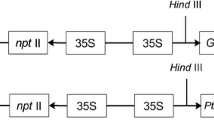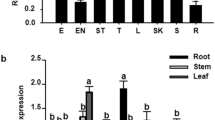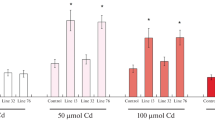Abstract
Phytochelatin synthase (PCS) catalyzes the synthesis of phytochelatins, which are involved in heavy metal detoxification in plants and other living organisms. Previously, we cloned a PCS1 gene from tobacco (Nicotiana tabacum) and showed that its expression in yeast (Saccharomyces cerevisiae) resulted in increased cadmium (Cd) tolerance and Cd accumulation (Kim et al., J Plant Biol 48:440–447, 2005). To examine the role of NtPCS1 in tobacco, we generated transgenic tobacco lines over-expressing NtPCS1 in the sense or antisense direction. Compared with other PCS1-expressing plants, NtPCS1-expressing tobacco exhibited a unique phenotype: increased tolerance to cadmium and arsenite, but no change in cadmium and arsenic accumulation. In addition, the antisense-NtPCS1 tobacco lines showed growth retardation in the early stage, suggesting that phytochelatin also plays a role in plant development. These results demonstrate that NtPCS1 plays important roles in metal(loid) tolerance as well as in growth and development in tobacco.




Similar content being viewed by others
References
Brunetti P, Zanella L, Proia A, Paolis AD, Falasca G, Altamura MM, di Toppi LS, Costantino P, Cardarelli M (2011) Cadmium tolerance and phytochelatin content of Arabidopsis seedlings over-expressing the phytochelatin synthase gene AtPCS1. J Exp Bot 62:5509–5519
Chen J, Zhou J, Goldsbrough PB (1997) Characterization of phytochelatin synthase from tomato. Physiol Plant 101:165–172
Gasic K, Korban SS (2007) Transgenic Indian mustard (Brassica juncea) plants expressing an Arabidopsis phytochelatin synthase (AtPCS1) exhibit enhanced As and Cd tolerance. Plant Mol Biol 64:361–369
Gisbert C, Ros R, Haro A, Walker DJ, Bernal MP (2003) A plant genetically modified that accumulates Pb is especially promising for phytoremediation. Biochem Biophys Res Commun 303:440–445
Grill E, Winnacker EL, Zenk MH (1987) Phytochelatins, a class of heavy-metal binding peptides from plants, are functionally analogous to metallothioneins. Proc Nat Acad Sci USA 84:439–443
Guo J, Dai X, Xu W, Ma M (2008) Overexpressing GSH1 and AsPCS1 simultaneously increases the tolerance and accumulation of cadmium and arsenic in Arabidopsis thaliana. Chemosphere 72:1020–1026
Horsch RB, Klee HJ, Stachel S, Winans SC, Nester EW (1986) Analysis of Agrobacterium tumefaciens virulence mutants in leaf discs. Proc Nat Acad Sci USA 83:2571–2575
Howden R, Goldsbrough PB, Anderson CR, Cobbett CS (1995) Cadmium-sensitive, cad1 mutants of Arabidopsis thaliana are phytochelatin deficient. Plant Physiol 107:1059–1066
Kim YJ, Chang KS, Lee MR, Kim JH, Lee CE, Jeon YJ, Choi JS, Shin HS, Hwang S (2005) Expression of tobacco cDNA encoding phytochelatin synthase promotes tolerance to and accumulation of Cd and As in Saccharomyces cerevisiae. J Plant Biol 48:440–447
Kim YJ, Kim JH, Lee CE, Mok YG, Choi JS, Shin HS, Hwang S (2006) Expression of yeast transcriptional activator MSN1 promotes accumulation of chromium and sulfur by enhancing sulfate transporter level in plants. FEBS Lett 580:206–210
Lee M, Hwang S (2012) Cyc07 enhances arsenite tolerance by reducing As levels in Nicotiana tabacum and Arabidopsis thaliana. Plant Biotechnol Reports 6:391–395
Lee S, Moon JS, Ko T-S, Petros D, Goldsbrough PB (2003) Overexpression of Arabidopsis phytochelatin synthase paradoxically leads to hypersensitivity to cadmium stress. Plant Physiol 131:656–663
Li Y, Dhankher OP, Carreira L, Lee D, Chen A, Schroeder JI, Balish RS, Meagher RB (2004) Overexpression of phytochelatin synthase in Arabidopsis leads to enhanced arsenic tolerance and cadmium hypersensitivity. Plant Cell Physiol 45:1787–1797
Liu G-Y, Zhang Y-X, Chai T-Y (2011) Phytochelatin synthase of Thlaspi caerulescens enhanced tolerance and accumulation of heavy metals when expressed in yeast and tobacco. Plant Cell Report 30:1067–1076
Liu Z, Gu C, Chen F, Yang D, Wu K, Chen S, Jiang J, Zhang Z (2012) Heterologous expression of a Nelumbo nucifera phytochelatin synthase gene enhances cadmium tolerance in Arabidopsis thaliana. Appl Biochem Biotechnol 166:722–734
Maitani T, Kubati H, Sato K, Yamada T (1996) The composition of metal bound to class III metallothionein (phytochelatin and its desglycyl peptide) induced by various metals in root cultures of Rubia tinctorum. Plant Physiol 110:1145–1150
Mok YG, Lee BD, Lee CE, Kim DG, Meng Y, Rosen BP, Choi JS, Shin HS, Hwang S (2008) Tobacco gene Ntcyc07 confers arsenite tolerance by reducing As levels in S. cerevisiae. FEBS Lett 582:916–924
Pomponi M, Censi V, Girolamo VD, Paolis AD, Toppi LS, Aromolo R, Costantino P, Cardarelli (2006) Overexpression of Arabidopsis phytochelatin synthase in tobacco plants enhances Cd2+ tolerance and accumulation but not translocation to the shoot. Planta 223:180–190
Sauge-Merle S, Cuine S, Carrier P, Lecomte-Pradines C, Luu DT (2003) Enhanced toxic metal accumulation in engineered bacterial cells expressing Arabidopsis thaliana phytochelatin synthase. Appl Environ Microbiol 69:490–494
Schmöger MEV, Oven M, Grill E (2000) Detoxification of arsenic by phytochelatins in plants. Plant Physiol 122:793–801
Shukla D, Kesari R, Mishra S, Dwivedi S, Tripathi RD, Nath P, Trivedi PK (2012) Expression of phytochelatin synthase from aquatic macrophyte Ceratophyllum demersum L. enhances cadmium and arsenic accumulation in tobacco. Plant Cell Rep 31:1687–1699
Shukla D, Kesari R, Tiwari M, Dwivedi S, Tripathi RD, Nath P, Trivedi PK (2013) Expression of Ceratophyllum demersum phytochelatin synthase, CdPCS1, in E. coli and Arabidopsis enhances heavy metal(loid)s accumulation. Protoplasma 250:1263–1272
Vatamaniuk OK, Mari S, Lu Y-P, Rea PA (1999) AtPCS1, a phytochelatin synthase from Arabidopsis: isolation and in vitro reconstitution. Proc Nat Acad Sci USA 96:7110–7115
Vogeli-Lange R, Wagner GJ, Dziadkowiec D (1990) Subcellular localization of cadmium and cadmium-binding peptides in tobacco leaves: implication of a transport function for cadmium-binding peptides. Plant Physiol 109:945–954
Wang F, Wang Z, Zhu C (2012) Heteroexpression of the wheat phytochelatin synthase gene (TaPCS1) in rice enhances cadmium sensitivity. Acta Biochim Biophys Sinica 44:886–893
Wawrzynski A, Kopera E, Wawrzynski A, Kaminska J, Bal W, Sirko A (2006) Effects of simultaneous expression of heterologous genes involved in phytochelatin biosynthesis on thiol content and cadmium accumulation in tobacco plants. J Exp Bot 57:2173–2182
Wojas S, Clemens S, Sklodowska A, Antosiewicz DM (2010a) Arsenic response of AtPCS1- and CePCS-expressing plants- Effects of external As(V) concentration on As-accumulation pattern and NPT metabolism. J Plant Physiol 167:169–175
Wojas S, Ruszcznska A, Bulska E, Clemens S, Antosiewicz DM (2010b) The role of subcellular distribution of cadmium and phytochelatins in the generation of distinct phenotypes of AtPCS1- and CePCS3-expressing tobacco. J Plant Physiol 167:981–988
Wysocki R, Clemens S, Augustyniak D, Golik P, Maciaszczyk E, Tamas MJ, Dziadkowiec D (2003) Metalloid tolerance based on phytochelatins is not functionally equivalent to the arsenite transporter Acr3p. Biochem Biophys Res Commun 304:293–300
Zenk MH (1996) Heavy metal detoxification in higher plants: a review. Gene 179:21–30
Acknowledgments
This research was supported by Basic Science Research Program through the National Research Foundation of Korea (NRF) funded by the Ministry of Education, and the Bio-industry Technology Development Program funded by the Ministry for Food, Agriculture, Forestry and Fisheries, KOREA.
Author information
Authors and Affiliations
Corresponding author
Rights and permissions
About this article
Cite this article
Lee, B.D., Hwang, S. Tobacco phytochelatin synthase (NtPCS1) plays important roles in cadmium and arsenic tolerance and in early plant development in tobacco. Plant Biotechnol Rep 9, 107–114 (2015). https://doi.org/10.1007/s11816-015-0348-5
Received:
Accepted:
Published:
Issue Date:
DOI: https://doi.org/10.1007/s11816-015-0348-5




